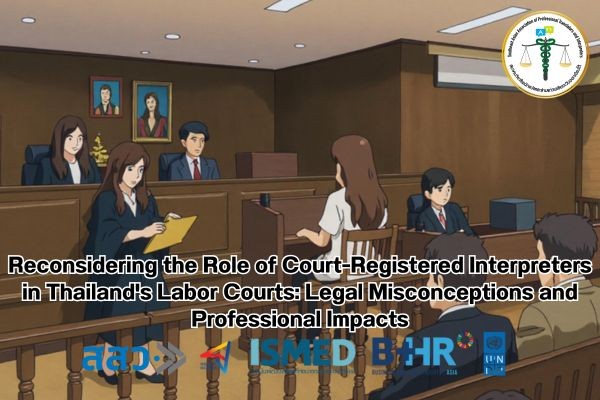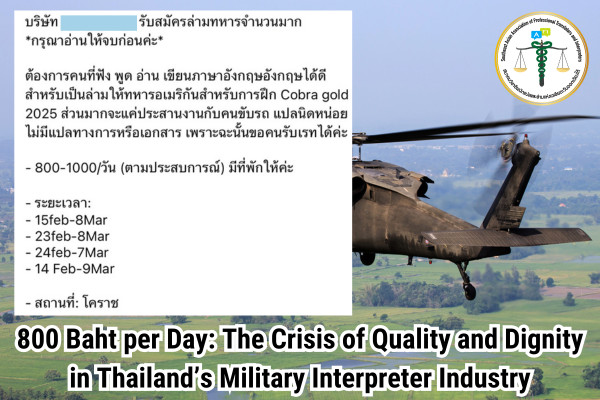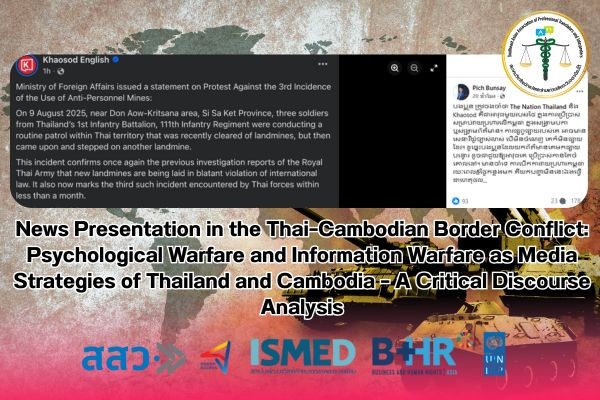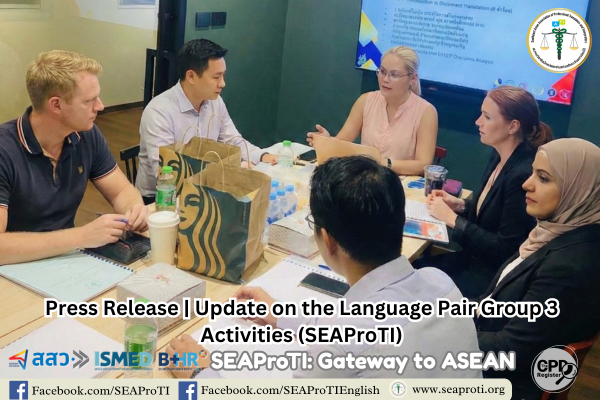Reconsidering the Role of Court-Registered Interpreters in Thailand’s Labor Courts:
Legal Misconceptions and Professional Impacts
Labor courts in Thailand serve a critical function in adjudicating disputes involving migrant workers. However, the qualifications for interpreters working in these courts remain unclear. This article examines the legal misunderstandings surrounding the requirement for “court-registered interpreters” and the adverse effects this misconception has on qualified professional interpreters who are not officially registered. By referencing Thai legal frameworks, international standards, and professional accreditation models, this article proposes a shift in policy from a registration-based system to one that prioritizes competence and professional ethics.
1. Introduction Over the past decade, the number of migrant workers in Thailand has increased significantly, resulting in a growing demand for interpreters in the justice system, particularly in labor courts. Despite this demand, the role and selection criteria for interpreters remain vague. A widespread belief that only “court-registered interpreters” are eligible has impeded access to qualified interpreters who hold international credentials. This article analyzes relevant legal provisions and examines the resulting implications for both the justice system and the interpreting profession in Thailand.
2. Characteristics of Proceedings in Thai Labor Courts Thailand’s labor courts follow a semi-inquisitorial system, in which judges take a central role in fact-finding rather than allowing adversarial exchange between parties (Phayapthai, 2020). Cross-examination and re-examination procedures are limited. The Labor Court Establishment and Procedure Act B.E. 2522 (1979) grants judges discretion to determine how evidence is heard and interpreted, without specifying interpreter qualifications. This flexibility highlights the importance of interpreter accuracy and neutrality over registration status.
3. Legal Basis for Interpreters in Thai Courts. While the Civil and Criminal Procedure Codes mention the use of interpreters, no provision mandates that interpreters must be registered with the court to serve in labor court proceedings. In practice, courts may maintain interpreter lists for administrative convenience, but these lists are not legally binding (Office of the Judiciary, 2018). Misinterpreting these internal lists as legal requirements has led to the exclusion of competent interpreters.
4. Professional Accreditation vs. Court Registration Many professional interpreters are certified by international bodies such as NAATI in Australia or SEAProTI in Southeast Asia. These certifications involve rigorous testing, ethics training, and continuing professional development (NAATI, 2020; SEAProTI, 2023). By contrast, Thailand’s court registration system lacks a formal competency evaluation, and thus registration should not be mistaken for professional qualification.
5. Registration as a Tool for Exclusion There have been numerous instances where interpreters with strong credentials have been rejected solely because they are not court-registered. Such practices may violate the right to a fair trial as protected by Article 29 of the 2017 Constitution of Thailand and Article 14(3)(f) of the International Covenant on Civil and Political Rights (ICCPR), to which Thailand is a signatory.
6. Impact on the Interpreting Profession Overreliance on court registration marginalizes highly competent interpreters who may avoid registration for ethical or administrative reasons. Legal, medical, and forensic interpreters often follow strict ethical standards that discourage exclusive affiliation with state institutions. Moreover, the absence of transparent registration criteria deters investment in interpreter training and weakens professional development.
7. International Best Practices Several countries use competency-based certification systems, such as the FCICE in the United States, CTTIC in Canada, and NRPSI in the United Kingdom. These systems prioritize professional standards through peer-reviewed assessments rather than mere administrative listing (Mikkelson & Jourdenais, 2015). Such models enable courts to access a wide range of qualified interpreters.
8. Policy Recommendations To ensure fairness in labor court proceedings and align with international standards, Thailand should:
-
Establish a national registry of interpreters based on verified qualifications and competencies.
-
Allow litigants to engage interpreters certified by recognized national or international professional organizations.
-
Provide judicial guidelines for evaluating interpreter qualifications beyond official court lists.
-
Support interpreter training and competency assessments in cooperation with professional associations.
9. Conclusion Interpreters play a vital role in ensuring access to justice, particularly in labor court cases involving migrant workers. Misconceptions about the requirement for court registration can undermine trial fairness and diminish the professional standing of interpreters. Transitioning to a competence-based qualification system will enhance the credibility of Thailand’s justice system and elevate the interpreting profession.
References
- Mikkelson, H., & Jourdenais, R. (2015). The Routledge Handbook of Interpreting. Routledge.
- NAATI. (2020). Certification System. National Accreditation Authority for Translators and Interpreters. https://www.naati.com.au
- Office of the Judiciary. (2018). Guidelines for Interpreter Engagement in Court Proceedings [in Thai]. Bangkok: Judicial Administration Office.
- Phayapthai, S. (2020). Labour Law and Adjudication in Thailand. Thammasat Law Review, 46(2), 211–234.
- SEAProTI. (2023). Interpreter Certification Standards and Code of Ethics. Southeast Asian Association of Professional Translators and Interpreters.
- United Nations. (1966). International Covenant on Civil and Political Rights. https://www.ohchr.org
SEAProTI’s certified translators, translation certification providers, and certified interpreters:
The Southeast Asian Association of Professional Translators and Interpreters (SEAProTI) has officially announced the criteria and qualifications for individuals to register as “Certified Translators,” “Translation Certification Providers,” and “Certified Interpreters” under the association’s regulations. These guidelines are detailed in Sections 9 and 10 of the Royal Thai Government Gazette, issued by the Secretariat of the Cabinet under the Office of the Prime Minister of the Kingdom of Thailand, dated July 25, 2024, Volume 141, Part 66 Ng, Page 100.
To read the full publication, visit the Royal Thai Government Gazette
ทบทวนบทบาทของ “ล่ามขึ้นทะเบียนศาล” ในศาลแรงงานไทย: ความเข้าใจผิดทางกฎหมายและผลกระทบต่อวิชาชีพ
ศาลแรงงานของประเทศไทยมีบทบาทสำคัญในการพิจารณาคดีแรงงาน โดยเฉพาะคดีที่เกี่ยวข้องกับแรงงานข้ามชาติ อย่างไรก็ตาม หลักเกณฑ์เกี่ยวกับคุณสมบัติของล่ามที่ใช้ในศาลแรงงานยังไม่มีความชัดเจน บทความนี้วิเคราะห์ความเข้าใจผิดทางกฎหมายและขั้นตอนปฏิบัติที่เกี่ยวข้องกับการใช้ “ล่ามขึ้นทะเบียนศาล” ในศาลแรงงาน และชี้ให้เห็นผลกระทบเชิงลบต่อกลุ่มล่ามวิชาชีพที่มิได้ขึ้นทะเบียนกับศาล แม้จะมีคุณสมบัติครบถ้วนตามมาตรฐานสากล โดยอาศัยบทบัญญัติกฎหมายไทย มาตรฐานระหว่างประเทศ และแนวปฏิบัติการรับรองวิชาชีพ บทความนี้เสนอแนวทางเชิงนโยบายเพื่อกำหนดเกณฑ์คุณสมบัติล่ามตามสมรรถนะอย่างชัดเจนในกระบวนการยุติธรรมด้านแรงงาน
1. บทนำ ในช่วงไม่กี่ปีที่ผ่านมา ประเทศไทยมีจำนวนแรงงานข้ามชาติเพิ่มขึ้นอย่างมีนัยสำคัญ ส่งผลให้บริการด้านภาษามีความจำเป็นอย่างยิ่งในบริบทของศาล โดยเฉพาะศาลแรงงาน อย่างไรก็ตาม สถานะและเกณฑ์การคัดเลือกผู้ทำหน้าที่ล่ามในศาลแรงงานยังคงไม่ชัดเจน ความเข้าใจที่แพร่หลายว่าต้องใช้ “ล่ามขึ้นทะเบียนศาล” เท่านั้น กลายเป็นอุปสรรคต่อการใช้ล่ามวิชาชีพที่มีคุณสมบัติทางวิชาการหรือได้รับการรับรองจากองค์กรวิชาชีพระดับสากล บทความนี้มีจุดมุ่งหมายเพื่อชี้แจงข้อกฎหมายที่เกี่ยวข้องและวิเคราะห์ผลกระทบของข้อจำกัดดังกล่าวต่อระบบยุติธรรมและวิชาชีพล่ามในประเทศไทย
2. ลักษณะกระบวนพิจารณาในศาลแรงงานไทย ศาลแรงงานของไทยดำเนินกระบวนพิจารณาแบบกึ่งไต่สวน (semi-inquisitorial system) โดยผู้พิพากษาเป็นผู้มีบทบาทหลักในการไต่สวนข้อเท็จจริง มากกว่าการให้คู่ความทำหน้าที่โต้แย้งกันเอง (Phayapthai, 2020) กระบวนการถามค้านและถามติงจึงไม่มีหรือมีในระดับจำกัด พระราชบัญญัติจัดตั้งศาลแรงงานและวิธีพิจารณาคดีแรงงาน พ.ศ. 2522 ให้อำนาจศาลในการพิจารณาว่าจะใช้หลักฐานใดและในรูปแบบใด แต่ไม่ได้กำหนดคุณสมบัติของล่ามไว้อย่างชัดเจน ความยืดหยุ่นดังกล่าวทำให้ความแม่นยำและความเป็นกลางของการแปลมีความสำคัญยิ่งกว่าการปฏิบัติตามรูปแบบทางทะเบียน
3. ฐานกฎหมายที่เกี่ยวข้องกับการใช้ล่ามในศาลไทย แม้ว่าประมวลกฎหมายวิธีพิจารณาความแพ่งและอาญาจะกล่าวถึงการใช้ล่ามในภาพรวม แต่ไม่มีกฎหมายใดที่กำหนดชัดเจนว่า ล่ามจะต้องขึ้นทะเบียนกับศาลจึงจะมีสิทธิปฏิบัติหน้าที่ในศาลแรงงาน ในทางปฏิบัติ ศาลอาจมีรายชื่อผู้ทำหน้าที่ล่ามไว้เพื่อความสะดวกในการประสานงาน แต่ไม่ถือเป็นข้อบังคับทางกฎหมาย (สำนักงานศาลยุติธรรม, 2018) การตีความรายชื่อภายในดังกล่าวว่าเป็นข้อกำหนดทางกฎหมายก่อให้เกิดความเข้าใจผิดและการกีดกันล่ามวิชาชีพ
4. การรับรองวิชาชีพกับการขึ้นทะเบียนศาล ล่ามวิชาชีพอาจได้รับการรับรองจากองค์กรวิชาชีพระดับนานาชาติ เช่น NAATI แห่งออสเตรเลีย หรือ SEAProTI แห่งเอเชียตะวันออกเฉียงใต้ ซึ่งต้องผ่านการทดสอบ ความรู้ด้านจรรยาบรรณ และพัฒนาวิชาชีพอย่างต่อเนื่อง (NAATI, 2020; SEAProTI, 2023) ในทางกลับกัน การขึ้นทะเบียนกับศาลในประเทศไทยไม่มีระบบการประเมินสมรรถนะอย่างเป็นทางการ ดังนั้น การขึ้นทะเบียนจึงไม่อาจใช้แทนคุณสมบัติหรือความสามารถได้
5. การใช้การขึ้นทะเบียนศาลในทางที่ผิด มีหลายกรณีที่คู่ความหรือทนายความพยายามปฏิเสธล่ามที่มีคุณวุฒิ เพียงเพราะไม่ได้ขึ้นทะเบียนกับศาล การกระทำลักษณะนี้อาจเป็นการละเมิดสิทธิในการได้รับการพิจารณาคดีอย่างเป็นธรรมตามรัฐธรรมนูญแห่งราชอาณาจักรไทย พ.ศ. 2560 มาตรา 29 และพันธกรณีตามกติการะหว่างประเทศว่าด้วยสิทธิพลเมืองและสิทธิทางการเมือง (ICCPR) มาตรา 14(3)(f) ที่ไทยเป็นภาคี
6. ผลกระทบต่อวิชาชีพล่าม การเน้นการขึ้นทะเบียนศาลมากเกินไปอาจทำให้ล่ามที่มีความสามารถสูงซึ่งไม่ขึ้นทะเบียน ถูกกีดกันจากการทำงานในศาล เช่น ล่ามที่ทำงานด้านกฎหมาย การแพทย์ หรือพยานผู้เชี่ยวชาญทางนิติวิทยาศาสตร์ ซึ่งยึดหลักจรรยาบรรณที่ไม่ผูกขาดกับองค์กรรัฐ การขาดเกณฑ์ที่โปร่งใสในการขึ้นทะเบียนยังเป็นอุปสรรคต่อการพัฒนาระบบการฝึกอบรมและวิชาชีพล่ามโดยรวม
7. แนวปฏิบัติในต่างประเทศ หลายประเทศมีระบบรับรองล่ามศาลตามมาตรฐานวิชาชีพ เช่น การสอบ FCICE ในสหรัฐอเมริกา ระบบรับรองของ CTTIC ในแคนาดา และทะเบียน NRPSI ในสหราชอาณาจักร ซึ่งล้วนอิงจากหลักเกณฑ์ด้านสมรรถนะและการประเมินโดยผู้ทรงคุณวุฒิ (Mikkelson & Jourdenais, 2015) ระบบเหล่านี้ช่วยให้ศาลสามารถเข้าถึงล่ามที่มีคุณภาพโดยไม่จำกัดเฉพาะผู้ที่อยู่ในรายชื่อเท่านั้น
8. ข้อเสนอเชิงนโยบาย เพื่อให้การพิจารณาคดีในศาลแรงงานไทยเป็นธรรมและสอดคล้องกับมาตรฐานสากล ควรดำเนินการดังนี้:
-
จัดทำทะเบียนล่ามระดับประเทศโดยอิงจากคุณวุฒิและสมรรถนะ
-
เปิดโอกาสให้คู่ความใช้ล่ามที่ได้รับการรับรองจากองค์กรวิชาชีพระดับชาติหรือสากล
-
จัดทำแนวทางให้ผู้พิพากษาสามารถประเมินคุณสมบัติล่ามได้โดยไม่ยึดติดกับรายชื่อศาล
-
ส่งเสริมการจัดอบรมและประเมินสมรรถนะล่ามร่วมกับองค์กรวิชาชีพ
9. สรุป ล่ามมีบทบาทสำคัญในการถ่ายทอดข้อมูลในกระบวนการยุติธรรมของศาลแรงงาน โดยเฉพาะในคดีที่เกี่ยวข้องกับแรงงานข้ามชาติ การยึดติดกับระบบขึ้นทะเบียนศาลโดยขาดความเข้าใจที่ถูกต้อง อาจทำลายความเป็นธรรมของคดีและบั่นทอนการพัฒนาวิชาชีพล่ามในประเทศไทย การปฏิรูประบบให้ยึดหลักสมรรถนะและมาตรฐานสากลจะเป็นประโยชน์ต่อทั้งกระบวนการยุติธรรม ล่าม และประชาชนโดยรวม
เอกสารอ้างอิง
- Mikkelson, H., & Jourdenais, R. (2015). The Routledge Handbook of Interpreting. Routledge.
- NAATI. (2020). Certification System. National Accreditation Authority for Translators and Interpreters. https://www.naati.com.au
- Office of the Judiciary. (2018). Guidelines for Interpreter Engagement in Court Proceedings [in Thai]. Bangkok: Judicial Administration Office.
- Phayapthai, S. (2020). Labour Law and Adjudication in Thailand. Thammasat Law Review, 46(2), 211–234.
- SEAProTI. (2023). Interpreter Certification Standards and Code of Ethics. Southeast Asian Association of Professional Translators and Interpreters.
- United Nations. (1966). International Covenant on Civil and Political Rights. https://www.ohchr.org
เกี่ยวกับนักแปลรับรอง ผู้รับรองการแปล และล่ามรับรองของสมาคมวิชาชีพนักแปลและล่ามแห่งเอเชียตะวันออกเฉียงใต้
สมาคมวิชาชีพนักแปลและล่ามแห่งเอเชียตะวันออกเฉียงใต้ (SEAProTI) ได้ประกาศหลักเกณฑ์และคุณสมบัติผู้ที่ขึ้นทะเบียนเป็น “นักแปลรับรอง (Certified Translators) และผู้รับรองการแปล (Translation Certification Providers) และล่ามรับรอง (Certified Interpreters)” ของสมาคม หมวดที่ 9 และหมวดที่ 10 ในราชกิจจานุเบกษา ของสำนักเลขาธิการคณะรัฐมนตรี ในสำนักนายกรัฐมนตรี แห่งราชอาณาจักรไทย ลงวันที่ 25 ก.ค. 2567 เล่มที่ 141 ตอนที่ 66 ง หน้า 100 อ่านฉบับเต็มได้ที่: นักแปลรับรอง ผู้รับรองการแปล และล่ามรับรอง

























